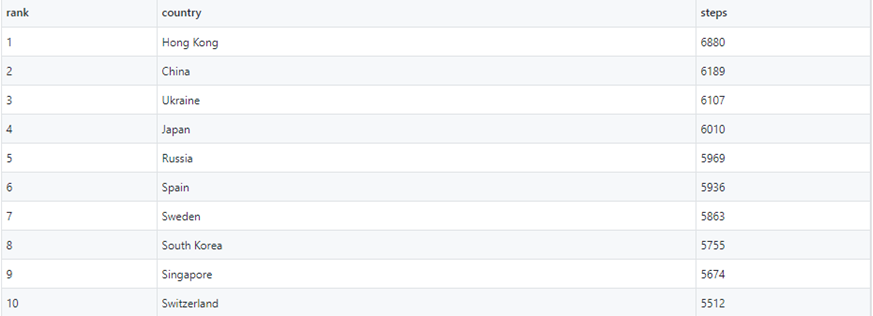Researchers from Stanford University used data captured from smartphones to analyze the habits of more than 700,000 individuals around the globe to find out the most active and laziest countries in the world.
The study, published in July in the advance online edition of Nature research journal, shows the Philippines to be among the “activity poor” countries, ranking fourth with 4,008 daily steps on average.
“If you think about some people in a country as ‘activity rich’ and others as ‘activity poor,’ the size of the gap between them is a strong indicator of obesity levels in that society,” researcher Scott Delp said.
Indonesia and Saudi Arabia are the most inactive countries with an average of 3,513 and 3,807 daily steps respectively while United Arab Emirates ranked 11th with 4,516 daily steps on average.
Hong Kong residents are the most active in the world with 6,880 daily steps on average.
Researchers measured the data through smartphones which are equipped with tiny sensors called accelerometers that automatically record stepping motions.
The research aims to improve public health campaigns against obesity and support policies to make cities more “walkable” and pedestrian-friendly.


Photo credit: github.com
RELATED
Weight gain during adulthood linked to this disease


Weight gain from early adulthood to age 55 may increase the risk of chronic diseases, premature death, and decreased the likelihood of achieving healthy aging, according to a study published by the US journal JAMA on Tuesday.
“Our study is the first of its kind to systematically examine the association of weight gain from early to middle adulthood with major health risks later in life,” said senior author Frank Hu, professor of nutrition and epidemiology and chair of the Department of Nutrition at the Harvard University.
“The findings indicate that even a modest amount (2.5 to 10 kg) of weight gain may have important health consequences,” he added.
Obesity is a major global health challenge. The worldwide prevalence of obesity was 11 percent for men and 15 percent for women in 2014 compared with the 1980 statistics of five percent for men and eight percent for women.
Among US adults, the average weight gain is 0.5 to 1.0 kg per year from early to middle adulthood and this modest yearly accumulation of weight eventually leads to obesity over time.
However, it is unclear how weight gain during the transition from early to middle adulthood, when most weight gain occurs, relates to subsequent health consequences, such as type 2 diabetes, hypertension and cardiovascular disease.
Hu and colleagues analyzed health data from nearly 120,000 study participants, including women in the Nurses’ Health Study between 1976 and 2012, and men in the Health Professionals Follow-Up Study between 1986 and 2012.
Participants were asked to recall their weight from early adulthood, age 18 for women and 21 for men, and to report their weight at age 55.
Women gained an average of 12.6 kg over early to middle adulthood, and men about 9.7 kg.
Compared to those who kept their weight stable, those who gained a moderate amount of weight had an increased risk of major chronic diseases and premature death, and were less likely to score well on a “healthy aging” assessment of physical and cognitive health.
In a meta-analysis of study participants from the two cohorts, each five-kg weight gain was associated with a 30 percent increased risk of type 2 diabetes, 14 percent increased risk of hypertension, eight percent increased risk of cardiovascular disease, six percent increased risk of obesity-related cancer, five percent increased risk of dying prematurely, and 17 percent decreased odds of achieving healthy aging.
“These findings may help counsel patients regarding the risks of weight gain,” the researchers wrote.
(Report via PNA)
Photo Credit: prevention.com
Lack of sleep raises risk of death


According to the researchers’ study published in the Journal of the American Heart Association, lack of sleep doubles the risks of death induced by heart diseases, especially for people who are diagnosed with diabetes, obesity, high blood pressure and cholesterol.
“If you have several heart disease risk factors, taking care of your sleep and consulting with a clinician if you have insufficient sleep is important if you want to lower your risk of death from heart disease or stroke,” said Julio Fernandez-Mendoza, lead author of the study and an assistant professor at Penn State College of Medicine, according to Agence France Presse.
The Pennsylvania researchers surveyed 1,344 adults with the average age of 49. They followed the survey participants for 16 years, wherein approximately 22 percent of the subjects died within the period.
The study said over 39 percent of the participants have at least three risk factors for heart disease collectively known as metabolic syndrome.
The metabolic syndrome components include elevated cholesterol, blood pressure, fasting blood sugar, and triglyceride levels.
“The short sleepers with metabolic syndrome were also 1.99 times more likely to die from any cause compared to those without metabolic syndrome,” the study said.
Participants who sleep for an average of six hours have 1.49 times higher risk of dying than healthier subjects.
Health experts recommend that adults should get at least seven to eight hours of sleep.
Photo Credit: Entrepreneur.com





